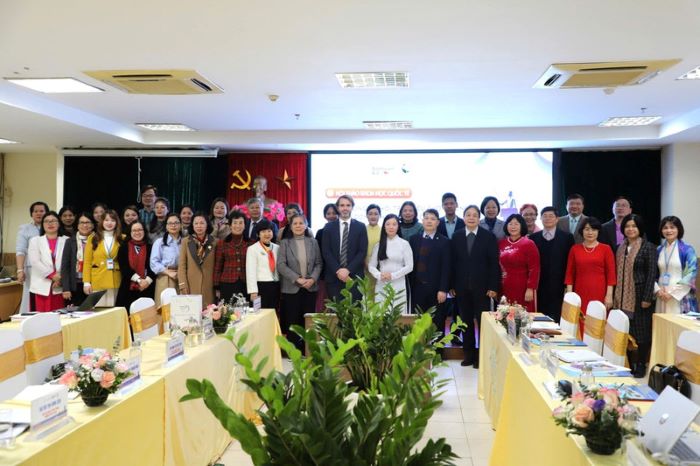TYM is a solid fulcrum for women with disabilities
 Ms. Le Thi An, a member with a disability who borrows TYM’s policy loan, opens private preschool Smile Kids.
Ms. Le Thi An, a member with a disability who borrows TYM’s policy loan, opens private preschool Smile Kids. Following in the footsteps of TYM staff at Transaction Office 02, Sam Son City, we visited Ms. Vu Thi Xinh’s beverage shop in center 13, Son Hai neighborhood, Truong Son ward – a disabled woman who is eligible for a policy loan for business investment. Ms. Xinh shared that when her mother was born, her legs were atrophied, so she finished 6th grade and stayed at home and sold baskets and nets on the corner of Son Hai street.
Understanding the difficult situation of her and her family, the Vietnam Women’s Union of Truong Son ward and TYM staff facilitated her to borrow 10 million dong from TYM’s preferential policy for trading. Thanks to her hard work staying up late, getting up early to sell goods, after a period of borrowing, she paid off both principal and interest. She continues to borrow more to buy items such as sugar cane juice machines, insulation cabinets and remodel the shop, bringing in an income of 4-5 million VND/month.
We went to the home of Ms. Le Thi An (born in 1987) who is a disabled woman, a member of center 12, Dong Quang street, Ham Rong ward, Thanh Hoa city, who is currently the owner of the Smile Kids private preschool at 284 Tran Hung Dao, Nam Ngan ward, Thanh Hoa city. An said, at the age of 14, unfortunately, she had a traffic accident and suffered from sequelae on one leg, making it difficult to walk. However, she was not discouraged, she was determined to study and entered Hong Duc University with a major in early childhood education. Graduating from school, she taught at Hoa Mi Kindergarten, Dong Tho ward. Until the age of 27, she was newly married, had a small child. But her disease recurred, she had to amputate one leg. She had to quit her job at the kindergarten, she had no income, plus she had to bear daily medical expenses which caused the family fall into a deadlock.
Seeing her difficult situation, the Vietnam Women’s Union of Ham Rong ward and TYM staff at Transaction Office 03 of Thanh Hoa City met, asked, and encouraged her to join TYM and took out a policy loan with preferential rate for people with disability with the amount of 20 million dong. Having received a loan, she invested in buying utensils and tools, renting a place to open Smile Kids Private Kindergarten. After 4 years as a member of TYM, she has borrowed and paid through many rounds of loans. Currently, classes in her kindergarten always have from 40 to 50 children, creating jobs for 4 teachers and 1 nutritionist with an income of 5 million VND/person/month.
“Since joining TYM until now, I realize that in addition to having the opportunity to borrow money and save for life, members like us also benefit from very appropriate mechanisms and policies such as principal and interest are paid in small installments, at the end of the loan cycle, the debt is paid. The program also supports other useful communities such as health checks, scholarships for children, facial mask support during the epidemic season for members. Thanks to TYM, I have changed the perception that I am “broken but not disabled”, I must rise up to change myself”, Ms. An said.
Talking to us about TYM’s policy funding for women with disabilities, Director of TYM Thanh Hoa Branch Nguyen Nhu Dien said: “Currently in Thanh Hoa province TYM has given 412 poor members, 1,350 near-poor members and 57 disabled members borrowed nearly VND 10 billion from preferential policies. In addition, TYM Thanh Hoa Branch is providing many types of loans to TYM members, including: policy loan for poor households (according to the Government’s regulations), members with physical disabilities certified by the local government, the member/husband/child of the member infected with HIV, certified by the local government or medical facility; loan to support near-poor households; economic development loan for TYM members who need to take out loans to invest in production and business activities in order to increase household income; multi-purpose loan for TYM members who have needs to serve their lives, invest in legal production and business activities to increase household income, with preferential interest rates for members with low income, housing loan and investment loan for members and households with production and business models.






